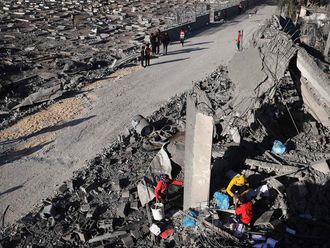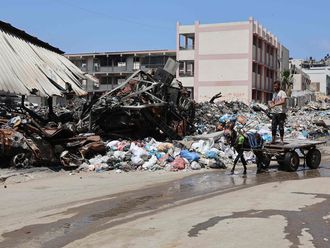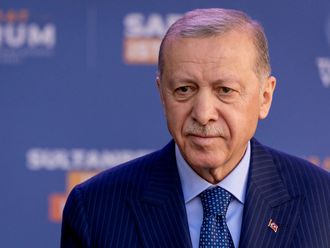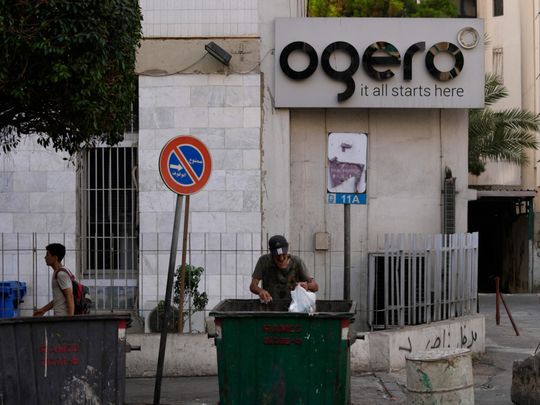
BEIRUT: Shopping for grapes at Beirut’s wholesale market to resell from her produce cart, an exhausted Rawaa Ghosn described how another layer of her increasingly tenuous life was peeled away after she had to give up the use of her mobile phone in the face of skyrocketing rates.
“I am worried something might happen to me in the street,” the 66-year-old said, adding that she suffers from cancer, heart disease and diabetes. “I would usually call my children or anyone. Now, I cannot recharge my phone account.”
It’s just one more symptom of Lebanon’s unfolding economic crisis that the United Nations said last year had plunged 82% of the country into poverty. Amid some of the worst inflation in the world, the value of the Lebanese pound has plummeted by 90%.
When the Ministry of Telecommunications decided on July 1 to bring fees in line with the rising cost of operations, the price of mobile phone service quintupled while internet broadband fees more than doubled.
The caretaker minister of telecommunications, Johnny Corm, defended the spike, saying it is necessary to keep the sector afloat amid the country’s economic collapse. But it also meant that the rest of the population, whose real wages have nosedived with the currency, can’t afford their phones, which are used for a variety of essential tasks, including accessing the internet, checking when electricity is available and ordering from the pharmacy or grocery store.
Of course, phone use also depends on whether there is even service. Recently, employees at the country’s two mobile phone companies, Touch and Alfa, went on strike over wages. Later, they were joined by employees of the main telecommunications provider, Ogero.
The result has been disruptions in internet and cellular communications across the country, even completely shutting it down in some places.
Local media outlets reported that Corm had threatened to send the army into the service centres where employees are holding sit-ins if work didn’t restart.
In late 2019, Lebanon’s economy was crippled. As the currency crumbled, inflation on food reached 332%, the highest in the world over the summer, according to an August report from the World Bank.
The high prices for phone use also mean many lower-income families can’t reach the aid agencies and nongovernmental organizations that could help them. Mercy Corps, an international humanitarian aid organization, said it received 70% fewer calls and requests on its hotline in July than in previous months.
Elie Yaacoub, an analyst on a Mercy Corps team that compiled a report on the crisis, said other humanitarian organisations have reported a similar drop in calls. He added they are all trying to set up a free hotline, but that decision requires a judicial order - and judges in Lebanon are on strike.
Suicide prevention hotline
Embrace, Lebanon’s main suicide prevention hotline, has had an increased number of callers asking operators to call them back because receiving calls is free, said Mia Atwi, the group’s president and co-founder.
Those relying on mobile data for their jobs are also drastically affected. Omar Al Aridi, a driver in a ride-sharing application, said the cost of the data package he needs for work ballooned sixfold under the new rates.
“We are paying a lot, and the product is very small,” he said. His employer does not cover data expenses, leaving him to pay them on his own.
Before the crisis, the telecommunications sector was a major source of revenue for the Lebanese state, and its history is plagued by accusations of corruption and lack of transparency.
In an April report, the country’s Court of Audit revealed that between 2010 and 2020, Lebanon’s telecom sector registered $6 billion in expenses for the telecom firms, Touch and Alfa, which the audit characterized as excessively high compared with similar markets.
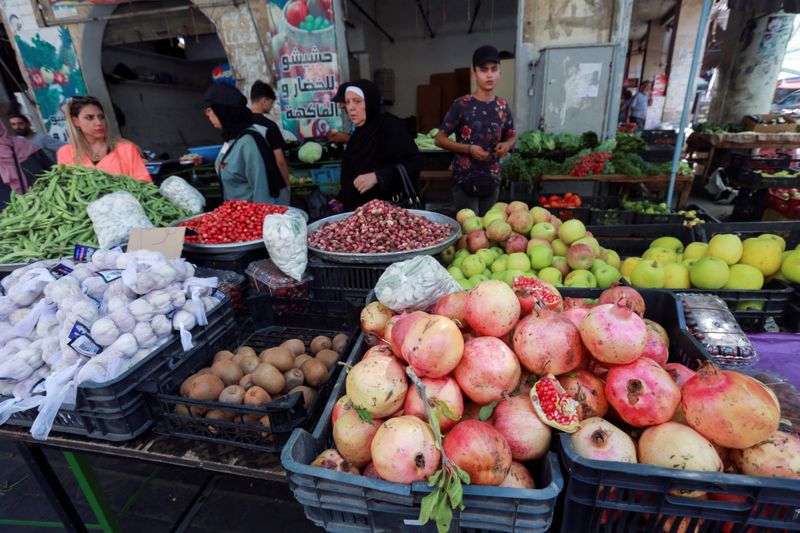
“Expenses for what? Who spent what? Who did they get permission from?” said Mohamad Najem, executive director of SMEX, an organization that works on advancing digital rights in Lebanon and the Arab region. SMEX is asking for a forensic audit to be conducted.
“We want to know exactly not just how this money was spent, on what basis it was spent, why it was spent, who they got permission from, whether this was the best decision, who took this decision, etc.,” he said.
As internet service, described by the United Nations as a human right, is priced out of reach for many, there are fears for the future. The younger generation in particular is struggling to find affordable internet to do schoolwork and university projects.
“I’m just hoping I will be able to afford it,” said Karen Jamal, a 20-year-old graphic design student who is already working several jobs to pay for her studies.
“Some programmes that I use need internet to work; that is gonna be a bit difficult,” she added. “I’m starting to sit in some cafes and Starbucks and such just to use the WiFi.”
Ghosn, the cart seller, who has witnessed much of Lebanon’s turbulent modern history in her life, had hoped the new generation would not have to deal with such a crisis.
“They made us live through wars, and now they killed our children with the economy. What else is there? Death is so much easier than this life,” she said.


